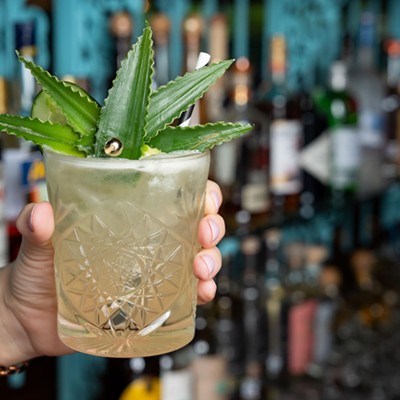During a recent trip across the pond, I visited the life residence of Samuel Johnson, a charming four-story house-turned-museum in south London. I'd recently read Johnson's A Journey to the Western Islands of Scotland, but was fuzzy on his most famous work, the Dictionary of the English Language, published in 1755. Nothing like some well-designed exhibits to inspire further reading; en route back to the States I spent my layovers perusing the Dictionary. Here are five food-related entries that tickled me:
5. Sausage: A roll or ball made commonly of pork or veal, and sometimes of beef, minced very small, with salt and spice; sometimes it is stuffed into the guts of fowls, and sometimes only rolled in flower.
Did he mean "flour"? Not that a sausage rolled in a daisy isn't lovely in its own way.
4. Turtle : 1. A species of dove. 2. It is used among sailors and gluttons for a tortoise.
Nice that "sailors" and "gluttons" are mutually exclusive groups.
3. Nutmeg: The nutmeg is a kernel of a large fruit not unlike the peach, and separated from that and from its investient coat, the mace before it is sent over to us; except that the whole fruit is sometimes sent over in preserve, by way of sweet-meat or as a curiosity. The nutmeg is of a roundish or oval figure, of a compact or firm texture, and its surface furrowed: it is of an extremely agreeable smell and an aromatick taste. There are two kinds of nutmeg; the male which is long and cylindrical, but it has less of the fine aromatick flavour than the female, which is of the shape of an olive. The Dutch import the nutmegs and mace from the East-Indies, and supply all Europe with them. The tree which produces them is not unlike our pear-tree in its manner of growth: its leaves, whether green or dried, have, when bruised, a very fragrant smell; and the trunk or branches, cut or broken off, yield a red liquor like blood. This tree is carefully cultivated. But that which produces the male nutmeg grows wild in the mountainous parts of the Moluccas. Nutmeg is much used in our foods, and is of excellent virtues as a medicine.
FYI, the Moloccas are part Indonesia, not, as I first guessed, some part of western Pennsylvania. I also was unaware of the plural of "nutmeg" but henceforth am going to work in "the nutmegs" into as many blog posts as possible.
2. Omelet: A kind of pancake made with eggs.
I want to see the eighteenth-century pancake that wasn't made with eggs.
1. Oats: A grain, which in England is generally given to horses, but in Scotland supports the people.
Oh, those quaint Scots. They might as well live in barns.
Follow Eating Our Words on Facebook and on Twitter @EatingOurWords





